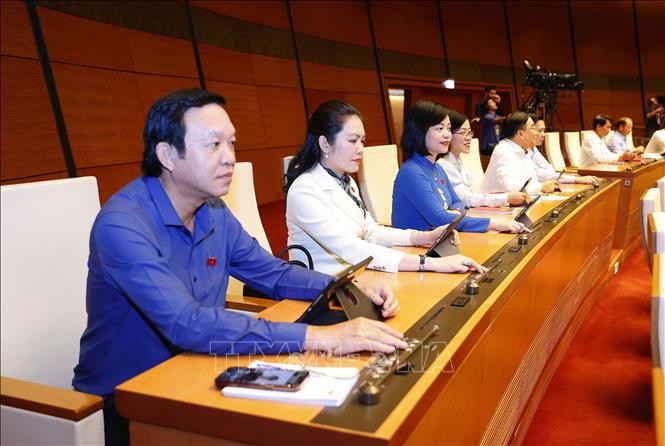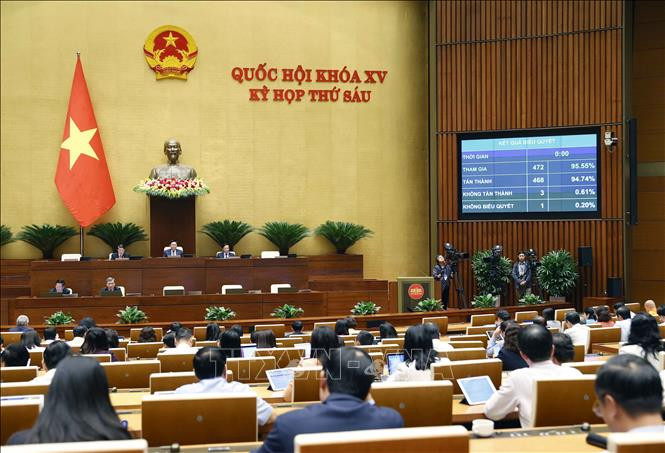On the afternoon of November 27, with 468 delegates in favor, accounting for 94.74% of the total number of delegates, the National Assembly passed the Law on Water Resources (amended).

Reporting on the explanation, acceptance and revision of the draft Law on Water Resources (amended), Chairman of the National Assembly's Committee on Science, Technology and Environment Le Quang Huy said that, regarding the content of regulating and distributing water resources (Section 1, Chapter IV), there are opinions suggesting that the State should prioritize investment in the construction of water storage works, combined with artificially supplementing groundwater in island areas, areas with great economic development potential but in areas with water scarcity, where natural water sources are not sufficient to meet development activities and assign the Government to specify in detail the activities of artificially supplementing groundwater.
In response to the opinions of National Assembly deputies, the draft Law has been reviewed, supplemented, and revised to provide for priority investment in searching, exploring, exploiting water sources, and storing water; preferential policies for investment projects in exploiting water for daily life and production for people in areas with scarce fresh water, ethnic minority areas, mountainous areas, border areas, and islands; and encouraging the implementation of water storage activities. The draft Law stipulates the application and development of technology in water storage; prioritizes investment and construction of water storage works combined with artificial replenishment of groundwater in islands and areas with scarce water; encourages organizations and individuals to research solutions and implement artificial replenishment of groundwater, and assigns the Minister of Natural Resources and Environment to specify the artificial replenishment of groundwater.
Regarding the economical and efficient use of water (Section 4, Chapter IV), the Chairman of the Committee on Science, Technology and Environment said that there were opinions suggesting that it is necessary to determine the proportion of water that must be circulated and reused for each specific project to increase the responsibility of project owners when choosing to apply advanced technology in production and wastewater treatment.
The Standing Committee of the National Assembly found that, in order to be consistent with the socio-economic development conditions of Vietnam, Article 59 of the draft Law stipulates the use of circulating water and water reuse at 3 levels: Encouraging water exploitation and use projects with solutions for circulating water use and water reuse; having plans and roadmaps stipulating types of projects that must have plans for circulating water use and water reuse for areas that frequently experience drought and water shortages and corresponding incentives according to the provisions of law; Mandatory application of circulating water use and wastewater reuse for investment projects in production, business and services that exploit, use water and discharge wastewater in areas where water sources are no longer able to withstand the load.
At the same time, Clause 4, Article 59 of the draft Law stipulates that the provincial People's Committee shall have a plan and roadmap to stipulate types of projects that must have water reuse plans for areas that frequently experience droughts and water shortages, and forms of incentives according to the provisions of law. Accordingly, the provincial People's Committee shall consider and decide on the proportion of water that must be circulated and reused for each project. Therefore, please keep it as in the draft Law.

Explaining the proposal to complete the content of the regulations on granting the right to exploit water resources for agricultural production in Article 69 to ensure fairness, reasonableness, and flexibility; considering only collecting fees for granting the right to exploit surface water resources for agricultural production on a business scale, the National Assembly Standing Committee said that Article 69 on fees for granting the right to exploit water resources stipulates cases where fees must be paid; cases of exemption and reduction of fees for granting the right to exploit water resources. Accordingly, the exploitation and use of water for agricultural purposes (large scale) subject to licensing must pay fees for granting the right to exploit water resources to ensure fairness and reasonableness for economic sectors exploiting and using water.
However, the time of granting the right to exploit water resources for this subject will be collected at the same time as the fee for using irrigation products and services when the State does not implement the policy of supporting the fee for using irrigation products and public services according to the provisions of the law on irrigation and the law on prices. As for small and medium-sized agricultural production, which is not subject to licensing, the draft Law stipulates that there is no need to pay the fee for granting the right to exploit and use water for agricultural production, including farmers who directly exploit surface water sources for agriculture; stipulates a reduction in the fee for granting the right in the case of "Exploiting water for agricultural production during drought, water shortage, and salinity intrusion" and to clearly demonstrate the policy of collecting the fee for granting the right for agricultural production activities as the Government has submitted to the National Assembly.